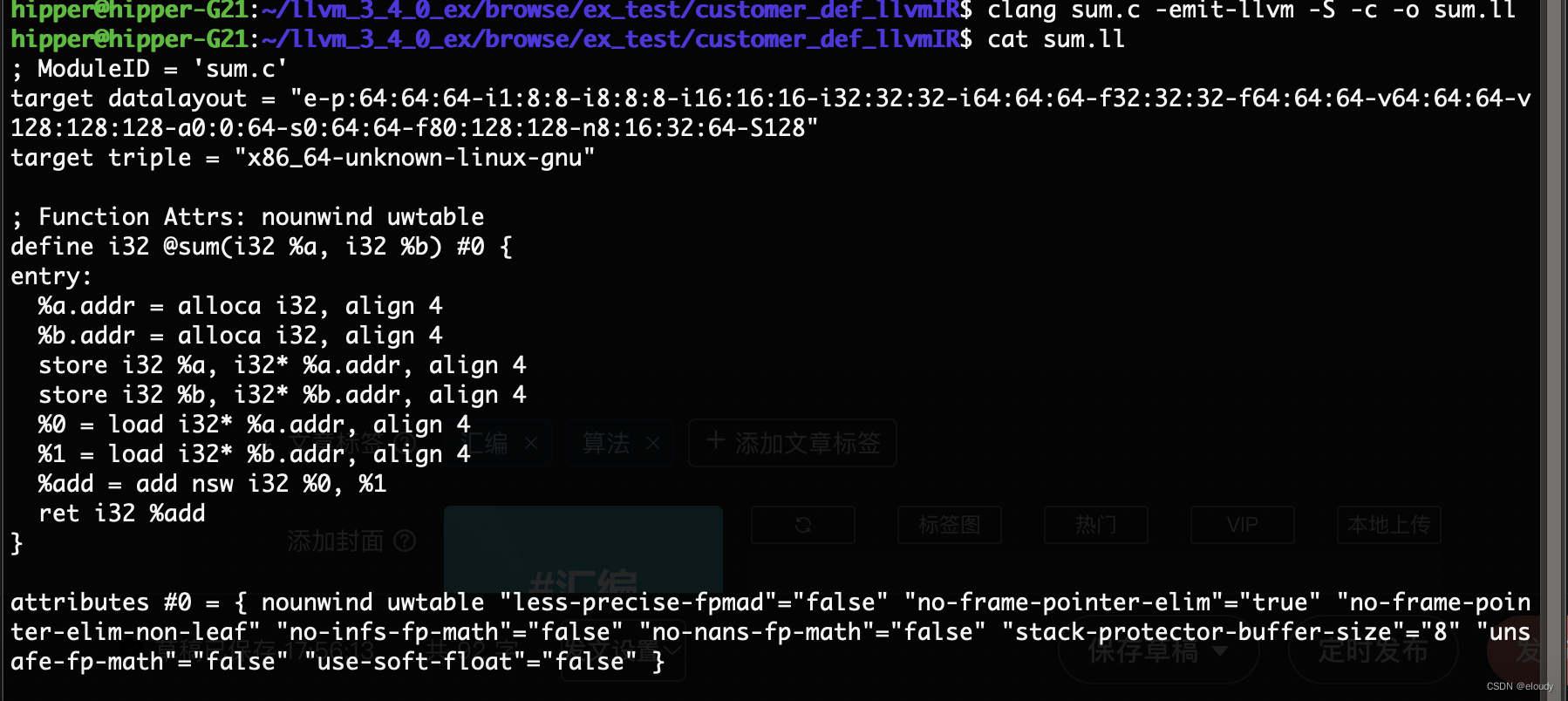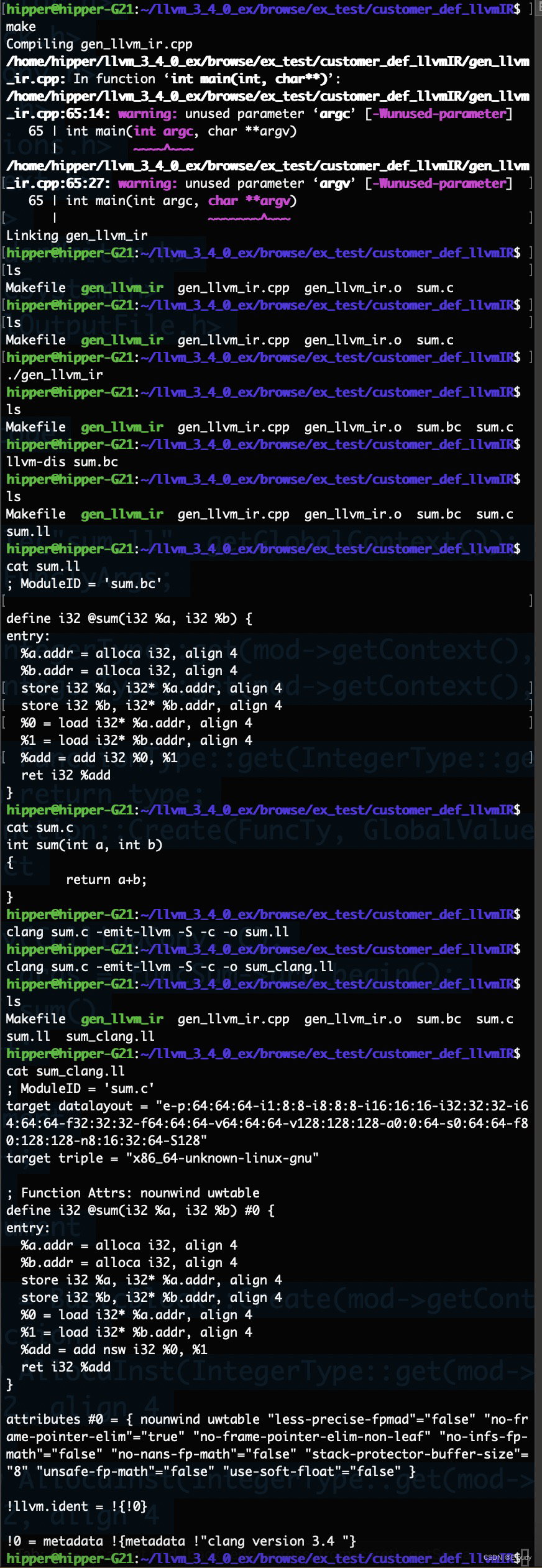本文主要是介绍手工将一个 llvm IR 汇编代码解析成为 bitcode 文件,希望对大家解决编程问题提供一定的参考价值,需要的开发者们随着小编来一起学习吧!
1,原始c语言文件
sum.c
int sum(int a, int b)
{return a+b;
}2,编译成为 LLVM-IR 汇编语言
clang sum.c -emit-llvm -S -c -o sum.ll

3,手工把 llvm IR 汇编语言解析成 bitcode
3.1,源码
gen_llvm_ir.cpp
#include <llvm/ADT/SmallVector.h>
#include <llvm/IR/BasicBlock.h>
#include <llvm/IR/CallingConv.h>
#include <llvm/IR/Function.h>
#include <llvm/IR/Instructions.h>
#include <llvm/IR/LLVMContext.h>
#include <llvm/IR/Module.h>
#include <llvm/Bitcode/ReaderWriter.h>
#include <llvm/Support/FileSystem.h>
#include <llvm/Support/ToolOutputFile.h>
using namespace llvm;//手工解析 sum.ll 成为 bitcode
Module *makeLLVMModule()
{Module *mod = new Module("sum.ll", getGlobalContext());SmallVector<Type*, 2> FuncTyArgs;FuncTyArgs.push_back(IntegerType::get(mod->getContext(), 32));FuncTyArgs.push_back(IntegerType::get(mod->getContext(), 32));FunctionType *FuncTy = FunctionType::get(IntegerType::get(mod->getContext(), 32), FuncTyArgs, false);// define function sum return type;Function *funcSum = Function::Create(FuncTy, GlobalValue::ExternalLinkage, "sum", mod);//define Function objectfuncSum->setCallingConv(CallingConv::C);Function::arg_iterator args = funcSum->arg_begin();// define arguments of sum()Value *int32_a = args++;int32_a->setName("a");// name the first argumentValue *int32_b = args++;int32_b->setName("b");// name the second argumentBasicBlock *labelEntry = BasicBlock::Create(mod->getContext(), "entry", funcSum, 0);// define entry of function AllocaInst *ptrA = new AllocaInst(IntegerType::get(mod->getContext(), 32), "a.addr", labelEntry); // %a.addr = alloca i32, align 4ptrA->setAlignment(4);AllocaInst *ptrB = new AllocaInst(IntegerType::get(mod->getContext(), 32), "b.addr", labelEntry); // %b.addr = alloca i32, align 4ptrB->setAlignment(4);StoreInst *st0 = new StoreInst(int32_a, ptrA, false, labelEntry);// store i32 %a, i32* %a.addr, align 4st0->setAlignment(4);StoreInst *st1 = new StoreInst(int32_b, ptrB, false, labelEntry);// store i32 %b, i32* %b.addr, align 4st1->setAlignment(4);LoadInst *ld0 = new LoadInst(ptrA, "", false, labelEntry);// %0 = load i32* %a.addr, align 4ld0->setAlignment(4);LoadInst *ld1 = new LoadInst(ptrB, "", false, labelEntry);// %1 = load i32* %b.addr, align 4ld1->setAlignment(4);BinaryOperator *addRes = BinaryOperator::Create(Instruction::Add, ld0, ld1, "add", labelEntry);//%add = add msw i32 %0, %1ReturnInst::Create(mod->getContext(), addRes, labelEntry);// ret i32 %addreturn mod;
}int main(int argc, char **argv)
{Module *Mod = makeLLVMModule();std::string ErrorInfo;std::unique_ptr<tool_output_file> Out(new tool_output_file("./sum.bc", ErrorInfo, sys::fs::F_None));if (!ErrorInfo.empty()) {errs() << ErrorInfo << "\n";return -1;}WriteBitcodeToFile(Mod, Out->os());Out->keep();return 0;
}
Makefile
LLVM_CONFIG ?= llvm-config
#CXX := clang++
ifndef VERBOSE
QUIET :=@
endifSRC_DIR ?= $(PWD)
LDFLAGS += $(shell $(LLVM_CONFIG) --ldflags)
COMMON_FLAGS = -Wall -Wextra
CXXFLAGS += $(COMMON_FLAGS) $(shell $(LLVM_CONFIG) --cxxflags)
LCXX :=$(shell $(LLVM_CONFIG) --cxxflags)
CPPFLAGS += $(shell $(LLVM_CONFIG) --cppflags) -I$(SRC_DIR)CLANGLIBS = \-Wl,--start-group \-lclang \-lclangFrontend \-lclangDriver \-lclangSerialization \-lclangParse \-lclangSema \-lclangAnalysis \-lclangEdit \-lclangAST \-lclangLex \-lclangBasic \-Wl,--end-groupLLVMLIBS = $(shell $(LLVM_CONFIG) --libs)PROJECT = gen_llvm_ir
PROJECT_OBJECTS = gen_llvm_ir.odefault: $(PROJECT)%.o : $(SRC_DIR)/%.cpp@echo Compiling $*.cpp$(QUIET)$(CXX) -c $(CPFLAGS) $(CXXFLAGS) $<$(PROJECT) : $(PROJECT_OBJECTS) @echo Linking $@$(QUIET)$(CXX) -o $@ $(LDFLAGS) $^ $(CLANGLIBS) $(LLVMLIBS) -lncurses.PHONY: clean
clean:$(QUIET)rm -f $(PROJECT) $(PROJECT_OBJECTS).PHONY: echo
echo:@echo "CXX is $(CXX)"@echo "LDFLAGS is $(LDFLAGS)}"@echo "CXXFLAGS is $(CXXFLAGS)"@echo "CPPFLAGS is $(CPPFLAGS)"@echo "SRC_DIR is $(SRC_DIR)"3.2,测试

注意:
使用 llvm-dis 出来的 sum.ll 文件中,最后的%add = add i32 %0, %1中,没有nsw关键字。
这篇关于手工将一个 llvm IR 汇编代码解析成为 bitcode 文件的文章就介绍到这儿,希望我们推荐的文章对编程师们有所帮助!






